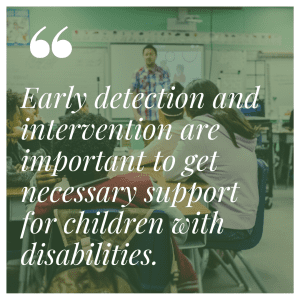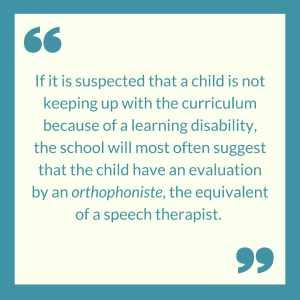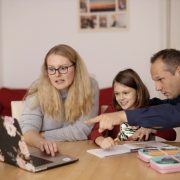For parents, facing concerns about a child’s development or learning can be scary and confusing; doing it in a country known for its bureaucracy and administrative maze of paperwork can be overwhelming. While parents and professionals agree that there is plenty of room to improve supporting and including children with developmental and learning disabilities in public schools, France has made improvements over the past 15 years since the loi de 2005 affirmed that all children have the right to receive an education and that parents have the right to be involved in developing educational plans. Educational plans, financial support, and dedicated educational supports in schools are available for children diagnosed with a developmental, learning, or other disability.

Developmental disabilities
Early detection and intervention are important to get necessary support for children with disabilities. Parents can bring up concerns with their child’s pediatrician who can do a brief screening and determine whether a visit to a specialist or specialized hospital for diagnosis is necessary. Parents of young children concerned with their development can go directly to their local PMI (service de protection maternelle et infantile), a useful resource which provides support for pregnant women and children up to age 6 and is the equivalent to Early Intervention services in the United States. These PMI centers provide free medical care including developmental screenings, and are connected to other services that provide support to children with developmental disabilities and their families. For children in a daycare, for example, the PMI can work directly with the crèche to determine that appropriate materials, supports, and adaptations are in place.

Learning disabilities
In primary school, when a child is having difficulty in the classroom, ideally teachers will recognize the need, speak with the parents, and try to provide extra support or modify or adapt the schoolwork. The first step for students struggling in class is to put in place a programme personnalisé de réussite éducative (PPRE). The PPRE allows the teacher to put a plan of action in place, with appropriate accommodations and support, directly in the classroom. The teacher may consult with the school director and the Rased (réseaux d’aides spécialisées aux élèves en difficulté), a team of special educators and school psychologists. It is important to note that not all public schools currently have a Rased team working fulltime in their building.
If it is suspected that the child is not keeping up with the curriculum because of a learning disability, the school will most often suggest that the child have an evaluation by an orthophoniste, the equivalent of a speech therapist. To have the evaluation reimbursed by social security, parents can talk with their child’s pediatrician, who will prescribe the evaluation. However, it is important to keep in mind that any standardized assessments should, whenever possible, be done in the child’s mother tongue. It can be difficult to find anglophone specialists whose services are reimbursed by social security, though there are several in the Paris region. SPRINT, an organization for professionals working with children with special needs, can provide resources for anglophone parents seeking information or referrals to services for their children.
Once the school receives the assessment, which will be reviewed and approved by a médecin de l’éducation nationale, a plan d’accompagnement personnalisé (PAP) is put into place based on observations by special educators and a school psychologist. This document will define measures decided on by the teacher, director, and Rased team that will allow the child to continue following the national curriculum. A PAP is reviewed every year and has a standardized form.
MDPH
A child with a developmental disability or severe learning difficulties that may require specialized services, in-school support, or any material or financial support may be referred to the Maison départementale des personnes handicapés (MDPH). This public agency officially recognizes a person’s disability which then allows the family access to additional services and support, both material and financial. Once an evaluation by the MDPH is requested by the family, a multidisciplinary team will meet along with the family to analyze the needs of the child using a standard form called the GEVA-sco. An enseignant référent will be assigned to the child and work with the family and school during the process and for future re-evaluations. Once the child’s diagnosis is officially recognized by the MDPH, a team will create a projet personnalisé de scolarisation (PPS), similar to an Individualized Education Program (IEP), is a legally binding document. A PPS is for children who meet the definition of a “handicap” according to article 2 of the loi de 2005 and whose dossier has been accepted by the MDPH. Although the entire process can take over a year to complete, it can be hugely beneficial to children needing a place in an appropriate school structure, an aide in the classroom (known as an AESH), specialized equipment, transportation, or a financial stipend to pay for specialized services and therapies. Unlike in the United States and the United Kingdom where schools have on-site staff providing most therapies directly in the school, in France they are most often external and in private practices. Parents are responsible for arranging these appointments and taking their child to these therapies.
Private schools hors contrat
If your child is in a private school hors contrat, first discuss with your child’s teacher any concerns about their learning and development. Smaller private schools may not have the resources to have a special educator on staff. However, the school director and teacher will likely refer the child to an orthophoniste. Parents can also ask the school director for references; most know of psychologists, speech therapists, and other professionals with whom they discuss questions and refer children. Finding a specialist who already has a relationship with the school staff can make the process smoother.
If, after an assessment, the school determines that your child needs additional support during the day, the costs of these services like a classroom aide are usually at the expense of the family who hires the aide, unless they have completed the process with the MDPH. If a child is enrolled in a school that does not feel capable of effectively accommodating their needs, the school may refer the parents to the public system or a larger private school that has a special education department. However, there are organizations in the Paris region working to advocate for smaller anglophone and bilingual schools to include children with special educational needs. EKIPP advocates for and supports parents of anglophone children with diverse learning, medical, or physical needs. The Learning Collaborative provides a network of support and continuing education on child development and disabilities for teachers, as well as resources for parents and professionals. Message Paris also has many resources, workshops, meet ups, and forums for English speaking parents in and around Paris. Joining an association such as AAWE brings valuable support from fellow parents and helps you build a network of bicultural families.
You can also purchase a copy of the latest edition of the AAWE Guide to Education in France, with its glossary explaining terms and acronyms relating to special needs, schools, and education in general.
While the French system of special education is not yet as accessible and developed in every public school as in many anglophone countries, the system has a variety of supports available from assessment to intervention. No matter the age of your child, as soon as you suspect a possible delay or notice a learning difficulty it is vital to seek support from professionals. The earlier you are able to detect and intervene with appropriate supports, the better the outcomes for your child.
– Jill Clément
Further Resources
General Special Ed France
https://www.education.gouv.fr/bo/14/Hebdo31/MENE1418316C.htm?cid_bo=81597
https://cache.media.eduscol.education.fr/file/guide_pratique_directeurs_d_ecole/00/1/Guide_direction_ecole_3_accompagnement_des_eleves_429001.pdf
MDPH
https://cache.media.eduscol.education.fr/file/guide_pratique_directeurs_d_ecole/41/1/Guide_direction_ecole_3_fiche_scolarite_des_eleves_en_situation_de_handicap_360411.pdf
PMI
https://www.caf.fr/allocataires/vies-de-famille/futur-parent/naissance/handicap-les-pmi-au-soutien-des-parents
UK
https://www.gov.uk/children-with-special-educational-needs/special-educational-needs-support
US
https://sites.ed.gov/idea/?src=policy-page
Rased
https://www.education.gouv.fr/les-reseaux-d-aides-specialisees-aux-eleves-en-difficulte-rased-11312
Quel plan pour qui
http://cache.media.education.gouv.fr/file/12_Decembre/37/3/DP-Ecole-inclusive-livret-repondre-aux-besoins_373373.pdf
Resources from Wendy Atkinson, owner and founder of Cornerstone Therapy Associates, LLC, based in Ashland, Virginia
Detailed resources to help persons and parents struggling to deal with sensory issues or to meet sensory needs.
How to create the perfect sensory room
https://www.angi.com/articles/sensory-room-ideas.htm
NHS Sensory Processing Hub
https://sensoryprocessinghub.humber.nhs.uk/downloads/
Ways to deal with common sensory issues
https://lookslikelanguage.com/2019/07/helpful-ways-to-deal-with-sensory-problems-plus-a-free-download.html
Jill Clément
Jill Clément has lived in France since 2011, working in international schools supporting children with special needs and training teachers on inclusive practices. She has a BS in psychology and education and an MA in child development with a focus in clinical developmental psychology. She lives in Paris with her husband and son.










Excellent resource for bi-lingual children with special needs. It is important to be a pro-active parent in the French system in order that your children receive the right support. The right information helps! Bravo Jill Clement! For the future – young adults receive far less support and have as many needs.